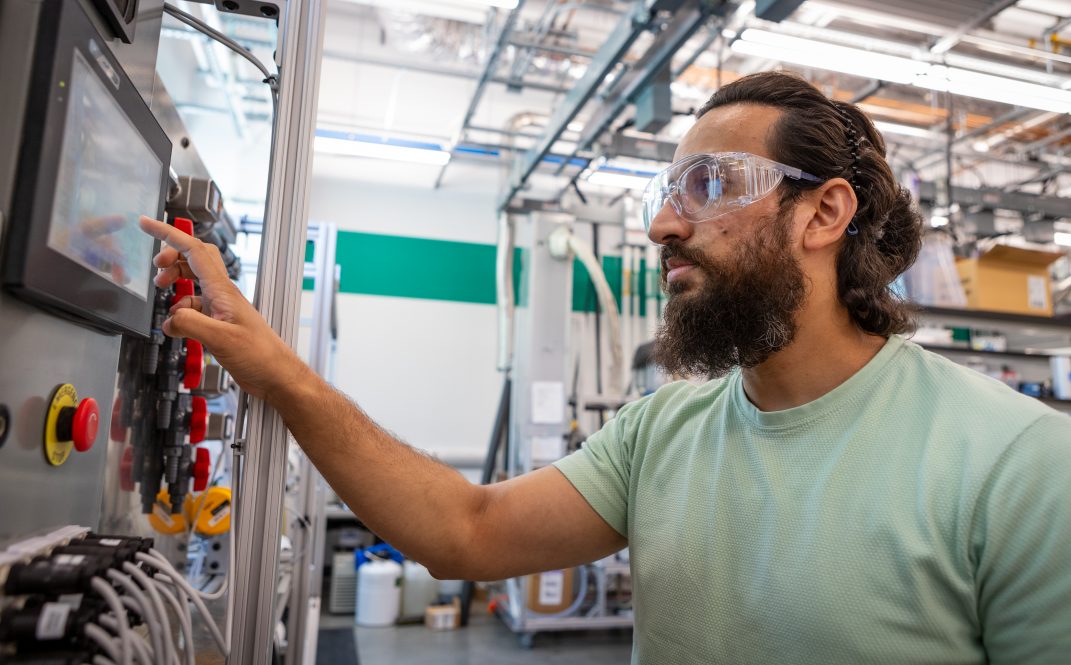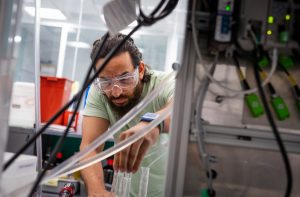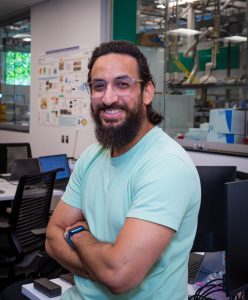Innovative brothers create wastewater reprocessing system to help address their native country's environmental crisis, conserving water and repurposing it for various applications

Usama Sheikh works on a commercial reverse osmosis membrane system in a UConn engineering lab. The system can be used to test membranes created using electrospray techniques. (Photo by Christopher LaRosa)
Usama Javed Sheikh likes to say that acquiring knowledge is one thing, but utilizing it is quite another. So, after spending years learning about environmental challenges facing the world, especially related to the waste-water crisis devastating his home country, Pakistan, he pursued undergraduate and graduate degrees in chemical engineering, then put his education and skills to work.
Sheikh, now a Ph.D. student studying chemical and biomolecular engineering at UConn's College of Engineering, was acutely aware that people were dying from ingesting untreated or poorly treated wastewater, and from the results of polluted water being dumped into canals, streams and rivers and leaching into aquifers.
Determined to make a difference, he immersed himself in researching wastewater treatment methodologies, and co-founded a company focused on finding and implementing creative and affordable solutions to Pakistan's wastewater crisis.
According to his research, close to 100,000 Pakistanis annually - and likely far more, since health and environmental recordkeeping is poor - die as a result of direct or indirect contact with wastewater.

What's more, half of those deaths are children under 5 years old. More than 95% of industrial wastewater is dumped into the environment in Pakistan without treatment, due to prohibitive costs, corruption, and land requirements. Yet, according to the World Bank, the country only spends $380 million annually trying to address these challenges, approximately 3.9% of the country's GDP.
In comparison, the United States spent $106.18 billion in 2022 on wastewater management, $113.08 billion in 2023, and is expected to spend $179.2 billion by 2030. The World Bank estimates that the impact on the Pakistani people from wastewater pollution, measured in economic loss, is at least $16.4 billion annually, which reflects the impact of disease and the loss of land value, tourism, recreation and investments.

After completing his undergraduate and master's degrees, Sheikh dove into rigorous experimentation and research to develop effective methodologies for meeting stringent environmental standards. Working with his brother, Muhammad Zaid, an expert in electrical, wireless communication and coding, they collaborated with the chemical and textile industries, focusing on wastewater treatment. Their efforts were centered around developing pre-treatment and post-treatment systems, aiming for zero-liquid discharge. Additionally, they revolutionized point-of-use reverse osmosis (RO) systems and were able to significantly prolong the lifespan of RO membranes used in water-filtration devices that connect to a single fixture to remove contaminants.
After graduating and spending a few years working in the field, Sheikh returned to UConn while Zaid remained in Pakistan. His goal, he explains, was to continue developing his skills and the knowledge needed to advance their work to a new level. He credits his UConn advisor, Jeffrey McCutcheon, associate professor, chemical and biomolecular engineering, for the support he has provided so Sheikh can continue working and completing his Ph.D.
"I rejoined UConn to better equip myself with advanced knowledge in technologies which will help us implement more robust solutions in Pakistan," Sheikh says. "At the same time, we were developing a color and protein removal system, and applied for a prestigious grant to support that research, along with systems we had already developed."
Every drop is precious
In 2018, prior to returning to UConn, Sheikh and his brother co-founded SE DROP (Save Every Drop). He had been working as a field engineer for a multinational corporation, but wanted to devote all his time to research and product development. Their research led them to create a process they call the Molecular Distortion Technique (MDT), which revolutionizes the way wastewater is approached by utilizing electricity to disintegrate pollutants at a molecular level. Sheikh explains that their system, with patents now pending, is compact, portable, economical, and easy to install and operate.
Once in place, their systems operate for three to five years without significant maintenance requirements, and with minimum energy utilization. Using their technology requires little training, and is tailored to Pakistan's textile industry, which uses millions of gallons of water every day.
"Far from being just another technological advance, MDT offers a practical solution that seamlessly integrates into existing infrastructure, addressing wastewater challenges directly and reducing the reliance on fresh-water sources," Sheikh says. "This system not only conserves water but also repurposes it for various applications, fostering a more sustainable ecosystem."
To put this into perspective, Sheikh says that creating 1 kg of fabric consumes over 200 liters of water, which typically is dumped. This wastewater contains up to 20,000 chemicals, which are discharged into the environment without treatment. As a consequence, World Bank research and other organizational studies show that 20 percent of all freshwater pollution is made by textile treatment and dyeing.
In addition to water pollution, the textile industry is the world's second-highest greenhouse gas producer after the oil industry. Total greenhouse gas emissions from textile production stands at 1.2 billion tons annually and accounts for 10 percent of global carbon emissions. Additionally, consuming fossil-fuel-based electricity, the primary source of energy in the apparel production process, greatly exacerbates greenhouse gas emissions.
Together, Sheikh and his brother pioneered the installation of Pakistan's inaugural greywater recycling system in Islamabad, conserving 36,000 gallons of water per month. Additionally, they created an innovative storm drain recycling system that garnered international attention. Their journey of innovation, Sheik says, took them to Dubai GITEX 2020, the TRT World Forum in Turkey, and the Young Founder Program in Singapore, and included winning Pakistan's national startup competition, in 2022, where they were recognized by Pakistan's president, Arif Alvi.

Moving to larger-volume solutions, teaching and collaboration
Their efforts resulted in another significant milestone in 2023 when they were awarded a $505,000 grant from the UK's Foreign, Commonwealth & Development Office (FCDO). This was in partnership with Dr. Wakil Shehzad from the University of Northumbria, UK, and designated to enhance their ability to pursue sustainable water solutions.
Utechnologies, this grant, Sheikh says, will be used to help foster collaborations with like-minded organizations and experts, with the goal of sharing knowledge and driving positive change in Pakistan. They also will focus on educating and raising awareness about the importance of sustainable textile practices. That's especially important, Sheikh says, explaining that developing and implementing the science often is easier than getting people to understand its value and to buy in. Fermenting an open attitude toward innovation, he adds, and navigating culture, costs, and politics is extremely complicated and challenging, especially in Pakistan.
"We want to play a valuable role in reducing Pakistan's environmental footprint and help drive positive change," Sheikh says. "We believe in the power of collaboration and innovation to create a circular economy in the fashion industry. This grant will propel us forward in our mission to transform wastewater into a valuable resource and promote eco-friendly practices in Pakistan and, eventually, in other countries facing similar water-related and environmental challenges."






